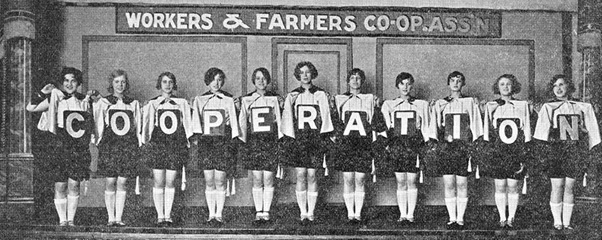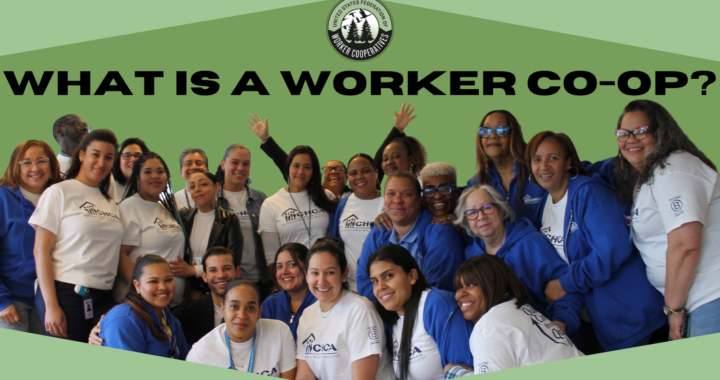What Is A Worker Cooperative?
A business owned and controlled by its workers
Worker cooperatives are values-driven businesses that put worker and community benefit at the core of their purpose. In contrast to traditional companies, worker members at worker cooperatives participate in the profits, oversight, and often management of the enterprise using democratic practices.
The two central characteristics of worker cooperatives are:
- Worker members own the business and they participate in its financial success on the basis of their labor contribution to the cooperative.
- Worker members have representation on and vote for the board of directors or governing body, adhering to the principle of one worker, one vote.
To be a worker cooperative, the entity must one where:
- Business entity has one or more classes of members
- Workers have a path to ownership
- Earnings and losses are allocated on basis of patronage
- Worker members have controlling ownership interest
- Governing body is elected by worker members on basis of one member, one vote
- Decisions about return on capital investment are made by worker members or governing body
You may download our complete “Worker Cooperative Definition” here.
Watch USWFC Co-op Clinic TA Manager Matt Feinstein describe how worker c0-ops differ from other types of co-ops
The model has proven to be an effective tool for creating and maintaining sustainable, dignified jobs; generating wealth; improving the quality of life of workers; and promoting community and local economic development, particularly for people who lack access to business ownership or sustainable work options.
Using data from our most recent annual census of worker cooperatives, we estimate that there are over 900 democratic workplaces in the United States employing over 10,000 people.
Learn more about worker cooperatives in this video by USFWC member MadWorC:
More about worker ownership
Legal forms
The corporate form for cooperatives varies. In states where there are cooperative incorporation statutes, businesses can incorporate as worker cooperatives. In states where there are no such statutes, democratic workplaces can take a variety of forms: S or C corporations, LLCs, etc. Whatever its incorporation status, a worker cooperative must create, in policy and practice, mechanisms for workers to make the decisions that affect the functioning and governance of the business.
Types of businesses
Worker-owned business and democratic workplaces exist across the country, with the greatest concentrations in the Northeast, the West Coast and the Upper Midwest. The vast majority of worker cooperatives in the United States are small businesses, with a few notable larger enterprises. Many are concentrated in the retail and service sectors. There are also well-established worker cooperatives in manufacturing and the skilled trades. Traditionally there has been a strong cooperative presence in food production, processing and and sales. In the past ten years, we have also seen the growth of worker cooperatives in the technology sector and home care.
Benefits
Cooperatives are the only form of business centered around membership, and member and community benefit is at the core of the cooperative model. Worker cooperative businesses are owned and run by their members, the people who work in them, and they operate for the benefit of these members.
The member benefits are multiple. A cooperative can be a way for people to start and own a small business together when they may lack the means or expertise to do so alone. Worker cooperative members can build assets in their cooperative business by retaining surplus every year in individual capital accounts. In a worker cooperative, workers own their jobs, so they decide how they are treated and how they want to operate the business. Worker-owners also get a lot of practice making decisions, building their skills in a variety of areas, and participating democratically in a process to benefit the larger group. These are the skills and habits of engaged community members, and they don’t stop at the workplace: you will often find worker-owners involved in the community in other ways.
Community benefits are clear too. Successful worker cooperatives tend to create long-term stable jobs, enact sustainable business practices, and develop linkages among different parts of the social economy. Worker-owned businesses have not only a direct stake in the local environment but the power to decide to do business in a way that is sustainable for us all. The worker cooperative movement is increasingly recognized as part of the larger movement for sustainability and a new economy based on people’s needs.

Cooperatives have a long history as a way for working people to create good, dignified jobs that they control, particularly for people who lack access to business ownership or even stable work options. Organizations undertaking economic development to build wealth in poor communities and communities of color have used worker cooperatives as a powerful vehicle for addressing economic inequality. Worker cooperatives have been shown to provide better working conditions and wages for typically low-wage work, and to increase household wealth for low-income workers. Worker cooperatives can also play an important role in building movements for economic justice and social change. As institutions where real democracy is practiced on a day to day basis, they are a model for the empowerment we will need to create the change we envision. As economic engines, they meet material needs, anchoring capital and jobs in communities.
International Cooperative Alliance Statement on the Cooperative Identity
Definition
A co-operative is an autonomous association of persons united voluntarily to meet their common economic, social, and cultural needs and aspirations through a jointly-owned and democratically-controlled enterprise.
Values
Co-operatives are based on the values of self-help, self-responsibility, democracy, equality, equity and solidarity. In the tradition of their founders, co-operative members believe in the ethical values of honesty, openness, social responsibility and caring for others.
Principles
The co-operative principles are guidelines by which co-operatives put their values into practice.
1st Principle: Voluntary and Open Membership
Co-operatives are voluntary organisations, open to all persons able to use their services and willing to accept the responsibilities of membership, without gender, social, racial, political or religious discrimination.
2nd Principle: Democratic Member Control
Co-operatives are democratic organisations controlled by their members, who actively participate in setting their policies and making decisions. Men and women serving as elected representatives are accountable to the membership. In primary co-operatives members have equal voting rights (one member, one vote) and co-operatives at other levels are also organised in a democratic manner.
3rd Principle: Member Economic Participation
Members contribute equitably to, and democratically control, the capital of their co-operative. At least part of that capital is usually the common property of the co-operative. Members usually receive limited compensation, if any, on capital subscribed as a condition of membership. Members allocate surpluses for any or all of the following purposes: developing their co-operative, possibly by setting up reserves, part of which at least would be indivisible; benefiting members in proportion to their transactions with the co-operative; and supporting other activities approved by the membership.
4th Principle: Autonomy and Independence
Co-operatives are autonomous, self-help organisations controlled by their members. If they enter to agreements with other organisations, including governments, or raise capital from external sources, they do so on terms that ensure democratic control by their members and maintain their co-operative autonomy.
5th Principle: Education, Training and Information
Co-operatives provide education and training for their members, elected representatives, managers, and employees so they can contribute effectively to the development of their co-operatives. They inform the general public – particularly young people and opinion leaders – about the nature and benefits of co-operation.
6th Principle: Co-operation among Co-operatives
Co-operatives serve their members most effectively and strengthen the co-operative movement by working together through local, national, regional and international structures.
7th Principle: Concern for Community
Co-operatives work for the sustainable development of their communities through policies approved by their members.
